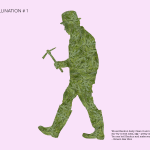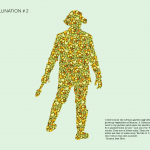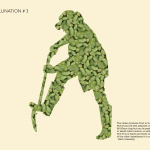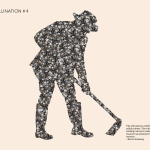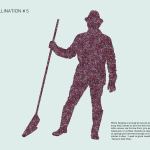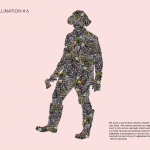2016
(900 mm x 600 mm) pigment ink print on archival paper x 6
4 channel video with no sound
Mono culture industrialised agriculture contributes to 40 per cent of green house gases. 80 per cent food production of the world come from family owned and small farms. In the US, more than 90 percent of agriculture subsidies go to farmers of five crops — wheat, corn, soybeans, rice, and cotton. In 2012, agricultural subsidies totalled an estimated $ 486 billion in the top 21 food-producing countries in the world. These subsidies push prices artificially down making agriculture in general unviable.
The Mamre House in Penrith, Sydney is a place where one makes peace
with the earth. It is an organic farm. ‘Open pollination’ primarily
involved three people – two farmers and myself. One was Simeon who
was from Burma. Simeon has first settled in Australia a few years ago as
a political refugee. He has got a garden patch at Mamre. The other
farmer is Nevin who has been living in St Clair, not far from Mamre for
several decades.
Indian farmers fought back as a mass movement against the attempts to patenting seeds and subsequent restrictions on saving seeds. Navdanya, a grass-root mass movement leading the way to achieve seed sovereignty in order to achieve food sovereignty. It has established 111 Community Seed Banks in 17 States across India. 2,00,000 farmers have been converted to organic farming in different parts of the country. Navdanya has trained about 500,000 farmers, conserved 3,000 varieties of rice.
Agri giants are disempowering farmers around the world. Under the
pretext of safeguarding patent/intellectual property rights, seed saving
has been criminalised in some countries and number of states in the
United States in favour of agri giants. In a landmark decision in 2013 the
Appeal Court of India prevented Monsanto, a global agri giant from
patenting seeds. Coincidently, in 2013, The Mamre House established a
community seed bank in St Marys on the outskirts of Sydney. Its
objective was to collect, preserve and distribute heritage seed.
Commissioned by Penrith City Council
